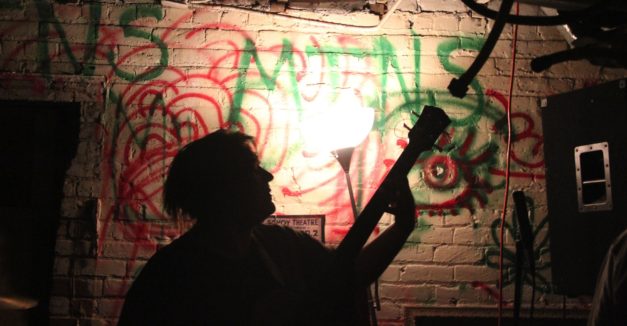DIY has a history tied to punk and alternative music. Basement shows at mom’s, printing your cover art at Kinko’s, and making zines that nobody ever reads are classic struggles to which many involved in countercultural music can relate. The set of values espoused by the DIY ethos can guide a person’s whole life — but they can also be commercialized and used as a buzzword for anything vaguely grungy.
With a recent resurgence of the term popping up around the state (see Nebraska DIY and Omaha Zine Fest), HN wanted to find out what it means today, and whether that has changed.
Read the answers of some in the DIY community below to find out what the hell we’re talking about.
[Have a definition of your own? Send it to editorial@hearnebraska.org.]
* * *
Marshal Fisher (Tree House, Lincoln)
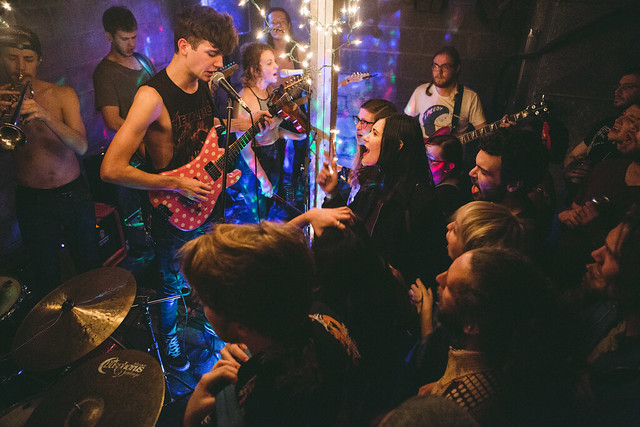
I Forgot To Love My Father at Tree House | photo by Cahner Olson
Okay, so: The main appeal to DIY culture to me is that it (ideally) creates and presents art in as noncommercial manner as possible. I feel art is more potent and honest when its creators aren’t burdened with the need to impress people and make money.
When most people start playing music, they view the path to “success” as going to Guitar Center, buying some stuff, using it exactly the way it was intended and then playing the bar circuit. Then you start to tour, and then somewhere along the way you get a recording contract. Then Pitchfork reviews your album and then you start playing stadiums and then you can say that you’ve “made it.”
The main function of the DIY scene is to show that path isn’t the only option, and there are hundreds of other ways you can find artistic fulfillment without buying into the above, which at its core is pretty toxic and doesn’t grant validation to the artist, but to the record companies and media conglomerates that are pooling all of the money into them. I don’t know … as an artist, I would rather be regarded as a sporadically appearing entity that shows up every few months to weird everyone out for 30 minutes with their crappy music than as an money making asset of a Fortune 500 company.
* * *
Mr. Fiend (Fiend House)
DSM-5 at Fiend House | courtesy of Fiend House
DIY for me is a sense of freedom. It can be a lot of work as well. Running a DIY venue is extremely taxing but comes with a set of intangible benefits such as a sense of community. Of course it’s also just fun. Nearly any form of self expression can be identified as DIY, from the way we dress to the music we make and love. Honestly, that’s really it for me: freedom of self expression, community and unity.
* * *
Mother (Fiend House)
Post-party depression is the only downfall as far as I see it. I like that all ages can experience what I was steered away from until I was an adult. Once The Ranch Bowl went away, it was hard to find a show unless you knew someone. It’s so nice to have so many people that feel like family and good live music in the house.
Rule 1: Don’t be an ass.
Rule 2: Be nice to the kids and pets.
Rule 3: Don’t be a cop.
Rule 4: No underage drinking, but if you are of age I have free booze.
Rule 5: No smoking inside, and no fucking drugs period. Take that to your car or whatever.
Rule 6. Play with my balls.
* * *
Sam Parker (Perpetual Nerves, Milk Run)
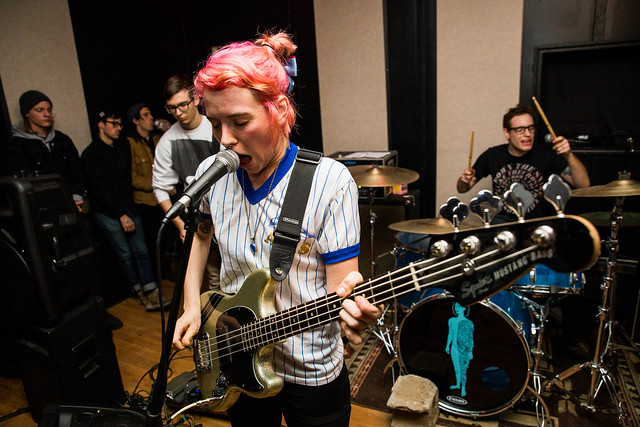
Milk Run | photo by JP Davis
To me, being DIY is about doing what you can with what you got. Some people have more than others, but that should never stop anyone of us from trying to achieve something. A majority of all current scenes are just a layer on top of what the scene before them started to build, and so on and so on. We just keep building and building. Making a stronger, more accepting scene for EVERYONE. Just because a few bricks fall off here and there, doesn’t mean the house is falling down. Never stop building.
* * *
Brad Smith (Almost Music)
Good topic. Although DIY has definitely come to be associated with punk/hardcore and it’s aesthetic, I think DIY still means the same basic thing it has meant for decades: the artist makes all of the decisions regarding the creation of their art (song structure, sound, design, format, distribution, etc). They are not beholden, monetarily or otherwise, to a label, a manager, a PR firm, or anyone else.
With today’s digital technology (Garageband, Photoshop, etc), it is much easier to make a “professional”-looking product and get it out into the world via YouTube, Bandcamp, SoundCloud — even as a singular, probably broke individual artist. While I think that is a marvelous cultural development, it can lead to an enormous glut of stuff to wade through.
That ease of “professionalism” has also naturally led to a subculture of very deliberate lo-fi sound and design (Columbus shitgaze scene, bedroom cassette culture, etc) in an attempt to maintain that original DIY aesthetic.
* * *
Jimmy Hobbs (The Bricks, Not Ben Shin)
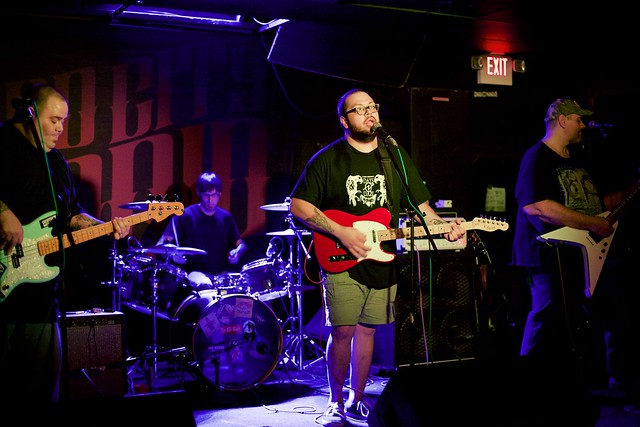
The Bricks | photo by Marco Meyer
DIY means needing to do something so badly that you don’t wait around for infrastructure to get it done. In practice it often means using your day job as a financial catalyst to set up your own shows, record, make merch, tour, etc.
And often times it means nobody coming to your shows, buying your merch, or listening to your records, but we keep doing it because if we didn’t our life would have less reason and the terrorists would win.
And in doing our own things ourselves we find a community of others who have the same goals and the hope is that eventually what we’re doing gets big enough that dudes on internet forums will call us sell outs.
* * *
Simon Joyner (Simon Joyner & the Ghosts)
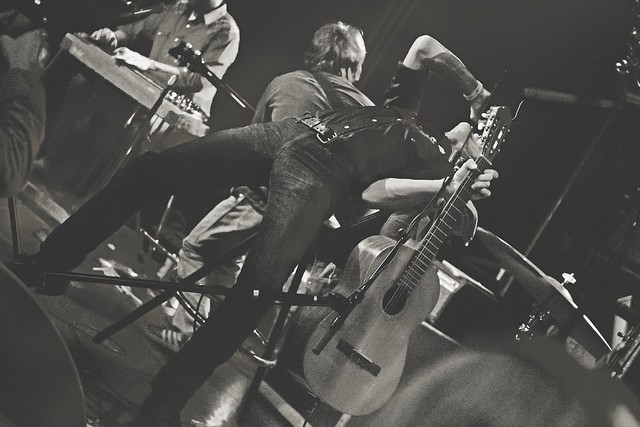
Simon Joyner | photo by Mike Machian
For me, DIY is just a way of going about things, born out of necessity sometimes but also part of your work ethic. For some things you literally do it yourself because there’s no one else to do it for you.
But for other things, to not do it yourself rubs you the wrong way or seems unacceptable. Like having a guitar handler who tunes and hands you guitars. That is not really acceptable, you know? At least I can say it isn’t for me. Do I want someone carrying all my gear for me?
Not really. I’ll do it myself with the other players in the band, it feels good, keeps me connected to what I’m making and what I’m doing. Hiring that out is the rock-n-roll equivalent of having a maid or something. I just wouldn’t want to do it.
So that’s DIY, feeling queasy at the thought of someone tuning your guitars and carrying your gear for you. I remember William Thornton playing with Frontier Trust at the Cog Factory in the 90’s sometime. He was already a veteran of so many punk rock bands by the point, and he said something along the lines of “If I ever can’t or don’t want to carry my amp on and off the stage myself then I’ll stop making music.” I feel the same way, it’s part of the package, or should be.
So, ultimately, DIY is just a value system. Everyone draws their lines in different places and that’s cool. For some I’m sure DIY means you should do literally everything yourself. I don’t feel that way. If someone is willing to put out my records, for example, I’m happy to let a label take on that side of things. That’s more of a collaboration. But I have certainly done it all when necessary and will do so again, I’m sure. To me DIY is doing the things yourself that no one else will do, as well as doing the things yourself that you wouldn’t feel right having someone else do.
* * *
Cameron Leininger (The Ridgways, Jocko)

The Ridgways | photo by Samuel Bennett
Do. It. Your. Self. “You” doesn’t have to be singular, and “it” can be anything. The idea that you, I, she, he, we, they can take steps to creating and supporting something in this world without asking for A) permission from authority, or B) relying on someone else to do it for us. Start a business, book a show, print a zine, run a label or don’t. The punk DIY community is made up of people who are tired of waiting for the change they want to see, the music they want to hear, the inclusion they want to feel, and the lives they want to life.
We rely on each other to learn how to pursue our interests without marginalizing others, and how to support ourselves without stepping on our neighbor. It’s a counterculture that promotes YOU. But, it’ll only give you back what you put into it, so don’t be an asshole.
* * *
David Nance (solo artist, Lush Bruise Crew)

David Nance | photo by Lauren Farris
It’s hard to cling on to words like “DIY” and “indie” because they’re so grossly branded and commercialized in this day and age. The agents of Evil are doing a great job in 2016! All I know is that I like to record music at home and I don’t like to polish things up. Audio Vérité. It’s a giant acknowledgement to the fact that we’re all just human after all. Also it’s cheap.




